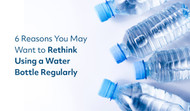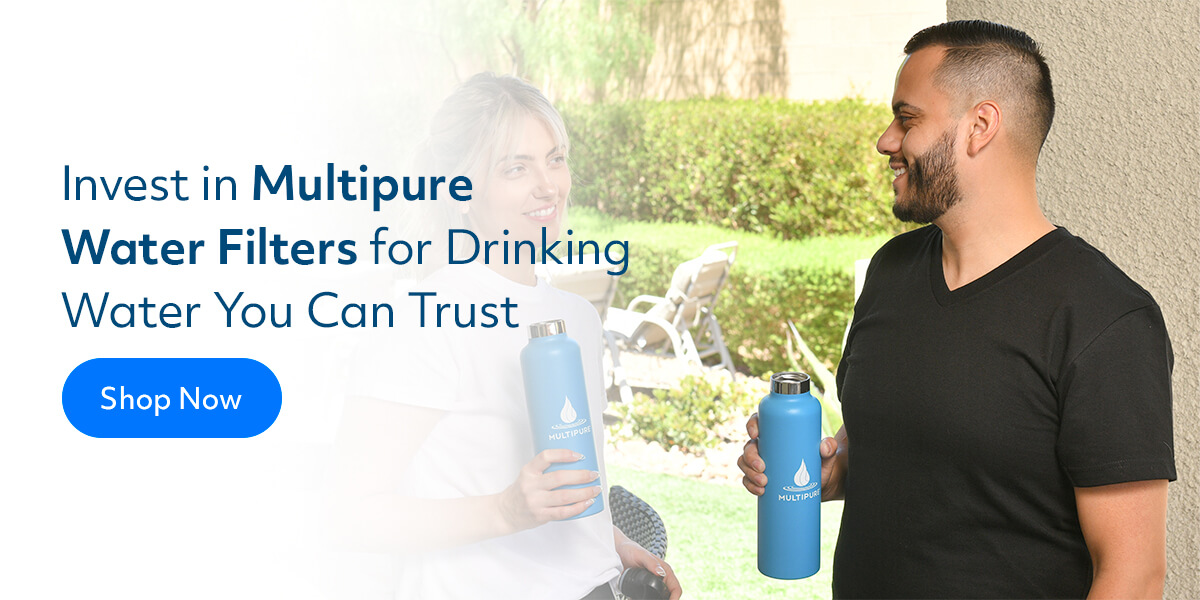6 Reasons You May Want to Rethink Using a Water Bottle Regularly
Posted by Kenton Jones on Aug 17th 2022
Single-use plastic water bottles are convenient sources of water for many people and families across the United States. However, the misconceptions surrounding these plastic bottles lead many people to think they are a healthier water source than they are in reality. Learning about bottled water can help you make more informed decisions about the water you and your family consume daily.
6 Reasons Why You Might Want to Rethink Bottled Water
Americans buy around 50 billion bottles of water annually. Many people choose to drink single-use bottled water over other drinking options because they believe it is healthier for them and higher quality. However, single-use plastic bottled water is less reliable and can introduce new health risks. Understanding how and why water bottles are bad can help you determine what water consumption method is best for you and your family.
1. Bottled Water Is Not Always Filtered
One common misconception about bottled water is that it is cleaner because it undergoes filtration treatment. But most bottled water has the same treatment as your tap water, if not less. Tap water has to meet strict requirements from the U.S. Environmental Protection Agency (EPA), while bottled water does not.
For example, the EPA requires counties and cities to provide information about contamination levels and quality reports for tap water, so you can understand how safe it is to drink your local water sources. Additionally, many places add fluoride to tap water, helping protect your teeth.
On the other hand, the EPA is not responsible for regulating bottled water, making it challenging to get health and safety information about it. Water bottle companies answer to the Food and Drug Administration (FDA).
2. Bottled Water Does Not Always Come From a Good Source
Many individuals believe that bottled water comes from clean, fresh sources and picture it coming from mountain springs and other pristine locations. This perception comes from the careful marketing and branding efforts by water bottle companies. Commercials and images depict clear, natural water sources that seem safe and refreshing.
Companies will also use terms like spring water to further this belief about their water's origins. Labeling bottled water as spring water leads customers to believe that it comes from springs, while the term means that the water only needs to come from an underground source with minerals. While this can be an underground spring, wells are much more common and accessible for water companies.
The lack of regulations on bottled water and its companies makes it challenging for people to determine the exact origins of their water. When you can't be sure where your water is from, you cannot guarantee its quality.
3. Plastic Bottles Can Have Toxins
Many plastic products include bisphenol A (BPA), which is a chemical companies use to strengthen plastic and help it retain its form. You can find it in everything from toys to plates and water bowls. Many reusable water bottles and other eating tools market that their products are BPA-free because of the adverse effects of the chemical on the body.
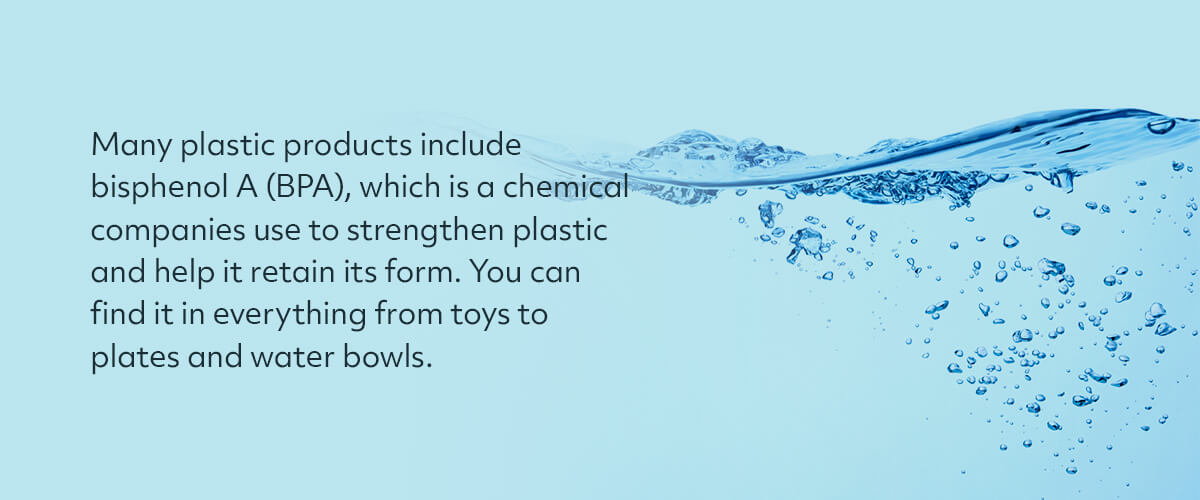 In the body, BPA works as a synthetic estrogen that can disrupt the endocrine system, which regulates and maintains your natural and ideal hormone levels. BPA can block and mimic other hormones, especially estrogen, causing several health risks for people who consume it.
In the body, BPA works as a synthetic estrogen that can disrupt the endocrine system, which regulates and maintains your natural and ideal hormone levels. BPA can block and mimic other hormones, especially estrogen, causing several health risks for people who consume it.
Medical organizations and studies have linked BPA to heart disease, diabetes, and obesity. Children and babies are at higher risk because the chemical can impact brain and body development.
Phthalates are another chemical compound found commonly in single-use plastic water bottles because it helps soften the material, making it easier to transport around and mold. Like BPA, this chemical can also disrupt the endocrine system and lead to several health problems.
BPA and other chemicals in the plastic can increase the longer people store water bottles. Over time, chemicals seep into the water from the plastic. Sun or heat exposure can speed up the process, making hot single-use water bottles less safe for individuals to drink, even if the bottles are unopened. Knowing these plastic water bottle health issues and risks can help you determine what water source is best.
4. Bottled Water Can Contain Microplastics
Microplastics are small pieces of plastic with a diameter smaller than 0.2 inches or five millimeters. Even though they are so small, these microplastics can take hundreds to thousands of years to break down, making them potentially detrimental to ecosystems and human health.
To understand microplastics and how water bottles play a role, you need to know the two types of microplastics — primary and secondary. Companies intentionally design and create primary microplastics for commercial use. They are common in skincare products, where they function as exfoliants. You can also find them in the textile industry used in different materials.
Secondary microplastics come from plastic products that break down into smaller components. Among the top contributors to secondary microplastics are single-use plastic products, like straws and water bottles. Exposure to UV radiation or harsh ocean waves can cause the plastics to decompose into microplastics quicker than they typically break down.
Both primary and secondary microplastics pose environmental hazards because they can easily infiltrate ecosystems. Their size allows them to move from location via the wind, runoff, and storms. Many scientists have found microplastics in the digestive systems of animals, especially those from aquatic ecosystems, like turtles. The microplastics can bind with chemicals, making them more dangerous when ingested.
While these plastics can endanger local and global ecosystems, they might also be hazardous to humans. Water treatment plants are often unable to remove microplastics altogether from drinking water. A study on major bottled water brands and distributors found that 93% of bottled water contains microplastics, with Nestle Pure Life in the lead for the most microplastic particles found in their water. On the other hand, your tap water contains 50% fewer microplastics.
Presently, scientists are unsure of the long-term effects of humans ingesting microplastics.
5. Bottled Water Is More Expensive
Bottled water is very convenient — you can find it almost everywhere you go, from grocery stores and gas stations to movie theatres and vending machines. While it can be a great option when you need something to drink on the go, many people buy water bottles in bulk to support their homes over tap water.
Disregarding the health and safety aspects of bottled water, you might be overspending on your drinking water with this method. On average, bottled water costs around $9.47 per gallon, while tap water costs about $0.005 for the same amount. Switching to tap water can help open up room in your budget, which you can invest in things that matter most to you, from health and education to family trips and vacations.
6. Bottled Water Poses Environmental Hazards
Because plastic is a synthetic material, it is hard to decompose. Plastics can spend long periods in ecosystems, disrupting wildlife lifecycles. Many animals accidentally ingest plastic products thinking they're food — scientists find evidence of plastic waste in the stomachs of animals from recognizable products, from the plastic rings that hold six-packs together to water bottle caps.
Water bottle manufacturing and distributing also takes a toll on the environment because it releases large amounts of carbon dioxide into the atmosphere. On average, one plastic water bottle creates around three ounces of carbon. This fact might seem small, but you must remember how many of these water bottles companies produce each year.
Plastic water bottles create carbon emissions at every step of their lifecycle. Plastic comes from petroleum, and harvesting and transporting these materials can add carbon to the atmosphere. From there, companies use carbon to manufacture the product at their factories and transport them to their stores.
Even at the end of a plastic bottle's life span, recycling often requires burning the original product, which creates large amounts of carbon emissions. Plastic production as a whole will result in carbon emissions rising by 56 billion tons by 2050.
Plastic water bottles also have a heavy water footprint, or the amount of water it takes to produce them in addition to water pollution. One pound of plastic creates around 28 gallons of water pollution. Especially with single-use plastics like water bottles, the cost outweighs the product.
Reuse isn't always possible with single-use water bottles. Their shape makes it challenging to clean them adequately, creating ideal growth spaces for bacteria and mold. Reusing your water bottles might help keep them out of landfills longer, but you also increase your risk of ingesting BPA and the other chemicals used to maintain the bottle's shape.
Better Alternatives to Bottled Water
When bottled water offers many disadvantages, it can be helpful to know what your options are for clean, reliable water. At Multipure, we have over 50 years of experience crafting and perfecting water filtration and purification devices, so you can have access to the best tasting and healthiest water possible.
1. The Aqualuxe
Our Aqualuxe water filtration device is the perfect kitchen tool to help you get excellent water from your tap. This model is compact and sleek, allowing you to store it alongside your other kitchen appliances or tuck it under the sink for safekeeping. Regardless of where you keep it, Aqualuxe can connect directly to your cold water line and lets you switch between filtered and unfiltered water by pressing a button.
The Aqualuxe has many unique functions that make it the ideal choice for busy families who want to manage their healthy water. You can change the filter in less than a minute, and the equipment will monitor the filter level for you, letting you know when it's time to replace it. It also can connect to Wi-Fi and has a leak detector to let you know if it needs maintenance.
2. The Aquaversa
If you want something versatile, we designed the Aquaversa filtration system to be just that. Like our other models, you can keep it below the sink or on your countertop. You can also hook it up to your refrigerator or ice maker for increased functionality and clean water.
3. The Aquamini
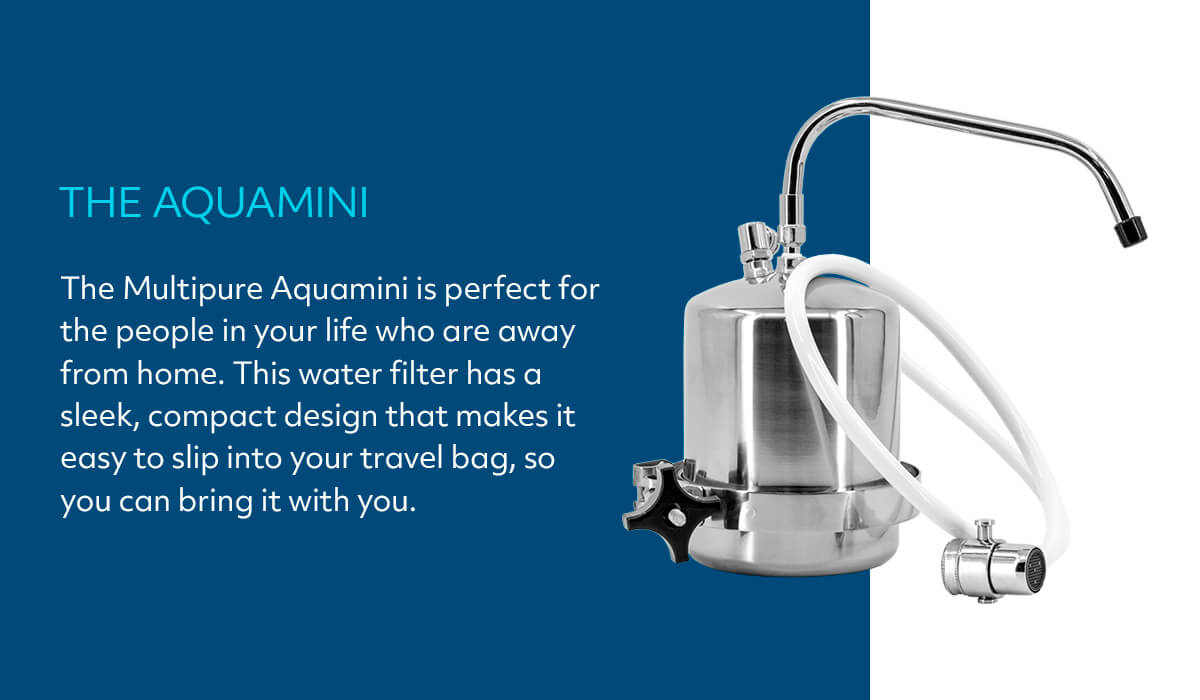
You deserve safe drinking water, regardless of where life takes you. The Multipure Aquamini is perfect for the people in your life who are away from home. This water filter has a sleek, compact design that makes it easy to slip into your travel bag, so you can bring it with you. You can use the Aquamini anywhere with a sink, including:
- Hotels and AirBnBs
- Cruise ships
- RVs
- The office
- Dorm rooms
You can also set it up at home where you have less room, whether in your kitchen or an upstairs bathroom. The Aquamini can connect to many sinks and faucets, increasing the availability of your drinking water.
4. The Water Emergency Treatment System
The Water Emergency Treatment (WET) System is another flexible drinking water tool you can use in situations where you don't have access to safe tap water. You can use this equipment in the aftermath of bad storms and hurricanes when municipal tap water might be compromised to ensure you and your family can stay safe and healthy. It is also a great tool to use for camping and RVing to access clean water when you are out exploring the wilderness.
Why Multipure Products?
Multipure products include several benefits when it comes to water filtration and purification. You can expect the best care from our product selection, including:
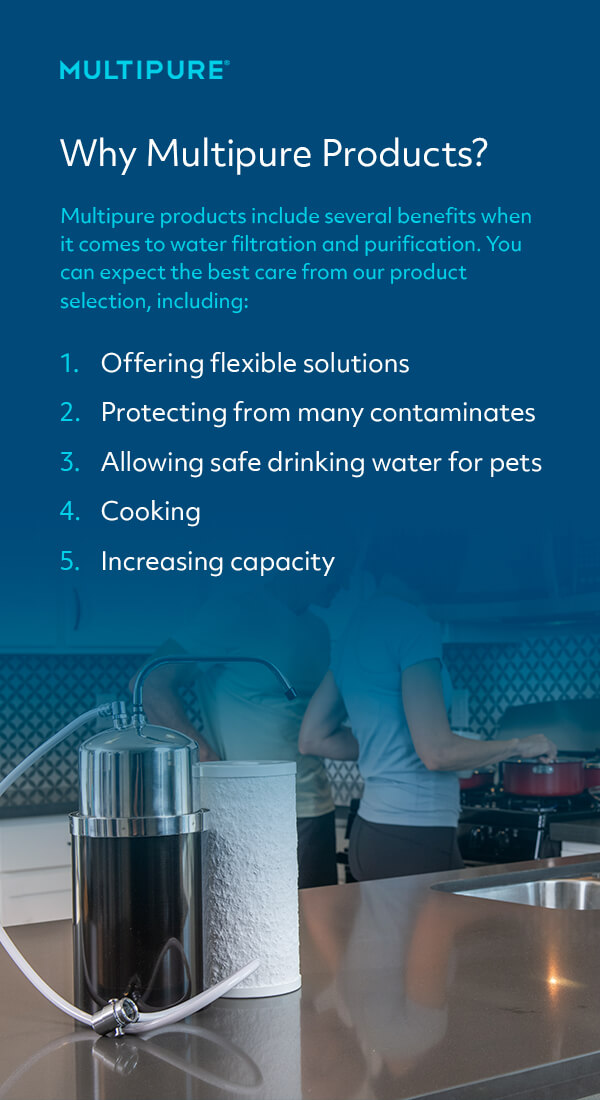
- Offering flexible solutions: When you select a system that works well for your home, you can choose kits to accompany it to help it better fit your individual needs. Many systems are compatible with under the sink and countertop connectivity, so you can store and use your filtration system to your preference.
- Protecting from many contaminants: Some filters can protect from some contaminates. Multipure filters offer comprehensive protection, giving you access to cleaner, fresher water. Whether you want to filter chlorine for better-tasting water or dangerous toxins, Multipure technology can help.
- Allowing safe drinking water for pets: Your pets are a huge part of your family. When protecting your family, they should be included. Multipure filters make it easy to give safe drinking water to your pets. They'll enjoy fresh, safe drinking water and you can rest easy knowing you are giving them the best care.
- Cooking: Whether you are boiling water or washing vegetables, water plays a big part in preparing and making meals. Regardless of your family's favorite meal, Multipure can help offer you healthy water to use during the cooking process. With easy switches to control filtered and unfiltered water, you can quickly rinse fruits and veggies, boil pasta, add water to soup, and make your favorite drinks. When mealtimes are over, you can wash dishes to your preference.
- Increasing capacity: Multipure products allow you to maintain your desired functionality at higher capacities than other options. Bottled water might require several bottles to meet your needs, while filtered pitchers only have a specific amount they can hold and you'll have to refill when needed. Because Multipure products can connect directly to your water lines or faucets, you can access purified water for any need, regardless of the size.
Invest in Multipure Water Filters for Drinking Water You Can Trust
With so many unknowns surrounding bottled water, you want a water source your family can depend on to provide you with safe drinking water. Multipure filters reduce amounts of many common contaminants, giving you access to water that is good for you and tastes good.
Explore our selection of drinking water filtration systems today and discover how Multipure filters can bring quality drinking water to your home

